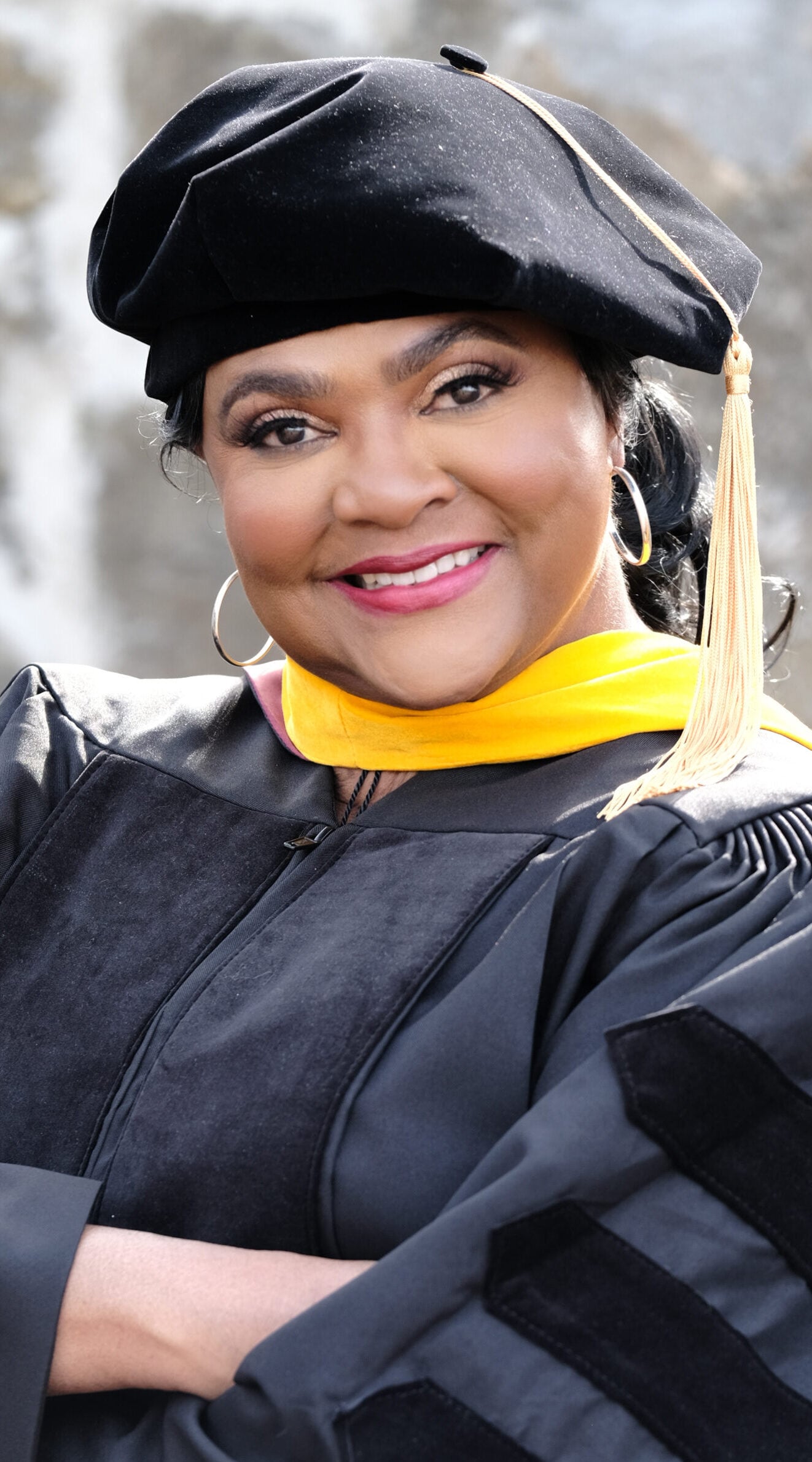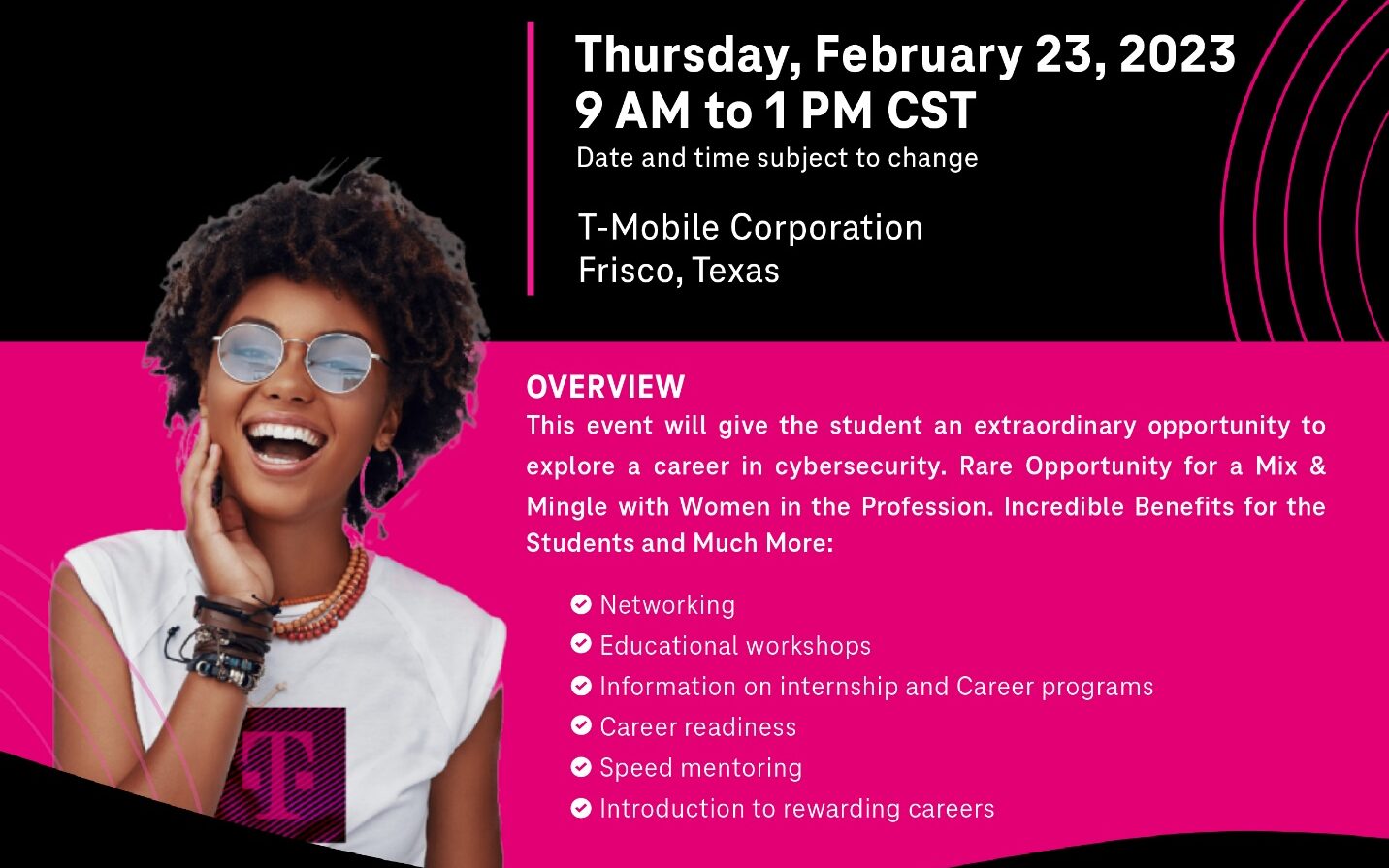Dr. Cheryl Cooper has worked hard to earn four credentials and degrees in cybersecurity: DCS, CISSP, CISSA and CDPSE. She’ll tell you, however, her life’s work is removing barriers that keep future generations from believing they can achieve those titles as well. (We'll save you the google search of all those certifications: Digital Communication Specialist (DCS), Certified Information Systems Security Professional (CISSP), Certified Systems Information Auditor (CISA) and Certified Data Privacy Solutions Engineer (CDPSE).)
“I am a champion for students, especially women of color, to pursue careers in cybersecurity and technology,” she says. “Our students can’t dream what they can’t see.”
A business information security officer with T-Mobile based in Overland Park, Kan., she is also a member of T-Mobile's Technology Diversity, Equity and Inclusion committee. And she serves as the president and founder of Women in Security Mentors, an organization that advocates for women and minorities to pursue careers in technology and in cybersecurity.
In 2022, Dr. Cooper led all-girls cybersecurity and technology career fests at T-Mobile’s headquarters in Bellevue, Wash., and Overland Park, Kan., welcoming a combined 265 students whom she says are underrepresented in the field and lack proper mentors.
“There are more than 3 million unfilled cybersecurity jobs today, yet I found that minority representation is in single digits in the field,” Dr. Cooper says. “Only 9% of cybersecurity jobs are held by black employees, with 24% of the jobs held by women. There are so many career paths in this field, not just coding, that I don’t think all our students are being introduced to. That’s where I come in.”
On Feb. 23, she is leading another all-girls cybersecurity and technology career event, this time at one of the company’s store locations in Frisco, Texas. The fact that it falls within Black History Month is not lost on her.
“These events are to support building the next generation of a diverse pipeline in technology and cybersecurity, and to support closing the race and gender gap,” she says. “Black History Month provides an opportunity to showcase the Black culture, contributions of Black people, and an opportunity to be of service to Black communities. We must show people of color, and especially our girls, visual opportunities so that they can see themselves in the world.”
Dr. Cooper says she sees how T-Mobile is building a workforce of the future, by advancing diversity, equity and inclusion in the workplace and beyond so as to reflect the communities the company serves.
Since 2021, T-Mobile has invested over $3 million in HBCUs, and Dr. Cooper’s efforts to introduce technology opportunities to minority youth, specifically female minorities, resonates powerfully with T-Mobile’s company values and its enterprise competency framework known as the "Values in Action,” one of which is creating affordable access for the next generation. The company has continuously expressed its commitment to help close the digital divide and provide affordable access to connectivity, so everyone has the opportunity to succeed. That devotion to equal opportunities is another reason Dr. Cooper is also working to launch a T-Mobile Cybersecurity Internship Program this year.
“It’s a paid internship for high school juniors and seniors that creates a career path in cybersecurity and provides certification while they’re studying in college,” she says. “Isn't that amazing?! At the age of 20, you have the opportunity to have a certification, a two-year degree and four years of experience under your belt.”
Dr. Cooper plans to do even more. We asked her to talk about her tireless work and to share her story as an influential Black woman in wireless technology.
How would you describe your journey into the technology field?
My journey into technology is not the traditional path. I grew up in the inner city of Kansas City and I wanted more opportunities, so I turned to the military and enlisted in the United States Navy. I went in as a radioman technical controller, responsible for troubleshooting telecommunication systems and changing out cryptographic keys. I learned so much, but when I returned to civilian life, I was surprised to see the lack of women and Blacks in technology. As I continued my career in technology, I saw racism, both unconscious and conscious bias, as well as a gender gap with women in STEM, specifically technology. This became even more apparent when I started going to industry conferences and didn’t see people who look like me. That’s what got me on my path to say, “I’ve gotta do something about this. I’ve got to be a changemaker. I’ve got to work on closing this race and this gender gap.” It’s been a passion of mine for a decade.
Tell us about the Cybersecurity and Technology Career Fests for high school students you’ve led on T-Mobile’s campuses. And why do you think it’s significant that your upcoming event falls during Black History Month?
For the last decade, I’ve been committed to doing what I can to close the race and gender gap in this cybersecurity and technology field because I know it holds so much opportunity for aspiring youth. Most companies have a recruitment strategy for cybersecurity roles. But what I found is that unless we incite our youth to pursue careers in technology and cybersecurity, we’re not likely to find them. That’s why I started the Women in Security Mentors Organization, an organization that introduces women and minorities in underserved communities to the cybersecurity field. Many of the high schools in the communities we have focused on are not introducing the students to these amazing and rewarding careers, especially when you look at Title I schools and inner-city schools. I pitched a paid high school internship program where juniors and seniors create a career path in tech and study for certification. I also talked with my senior leadership team about minority youth, especially female minorities, who aren’t aware of the types of jobs available in cybersecurity. I said we need to show that opportunities aren’t limited to coding. We have to show them that there are people who look like them currently working in roles like mine. That’s how I came to create our first career fests, which brought hundreds of female students to the T-Mobile campuses. And, next up, I’m on my way to Frisco, Texas, where we plan to welcome another hundred girls. We’re going to close that gap by introducing the students to these career fields and the opportunities they can visualize themselves in. We took a poll, and 97% of the students who attended our Bellevue career fest last year said they felt more hopeful about the future. Another 80% said they’d now consider STEM careers.
What does Black History Month mean to you?
Black History Month is important and especially so to me because we have started to say it’s not just Black people’s history, it’s America’s history. It provides an opportunity to honor the sacrifices that have been made for racial, social and economic equality, and what we are doing to close the gaps. Black History Month is an opportunity for us to learn where we came from and evaluate where we’re going. A lot of people don’t even know the significance that Black people played in fields like technology. More people know about the contribution of Black women in space exploration, women like Katherine Johnson, thanks to the movie Hidden Figures, but there’s so much more to learn. It’s an opportunity for not just the Black community, but for all people to pause and learn about a people’s contributions to our society overall.

